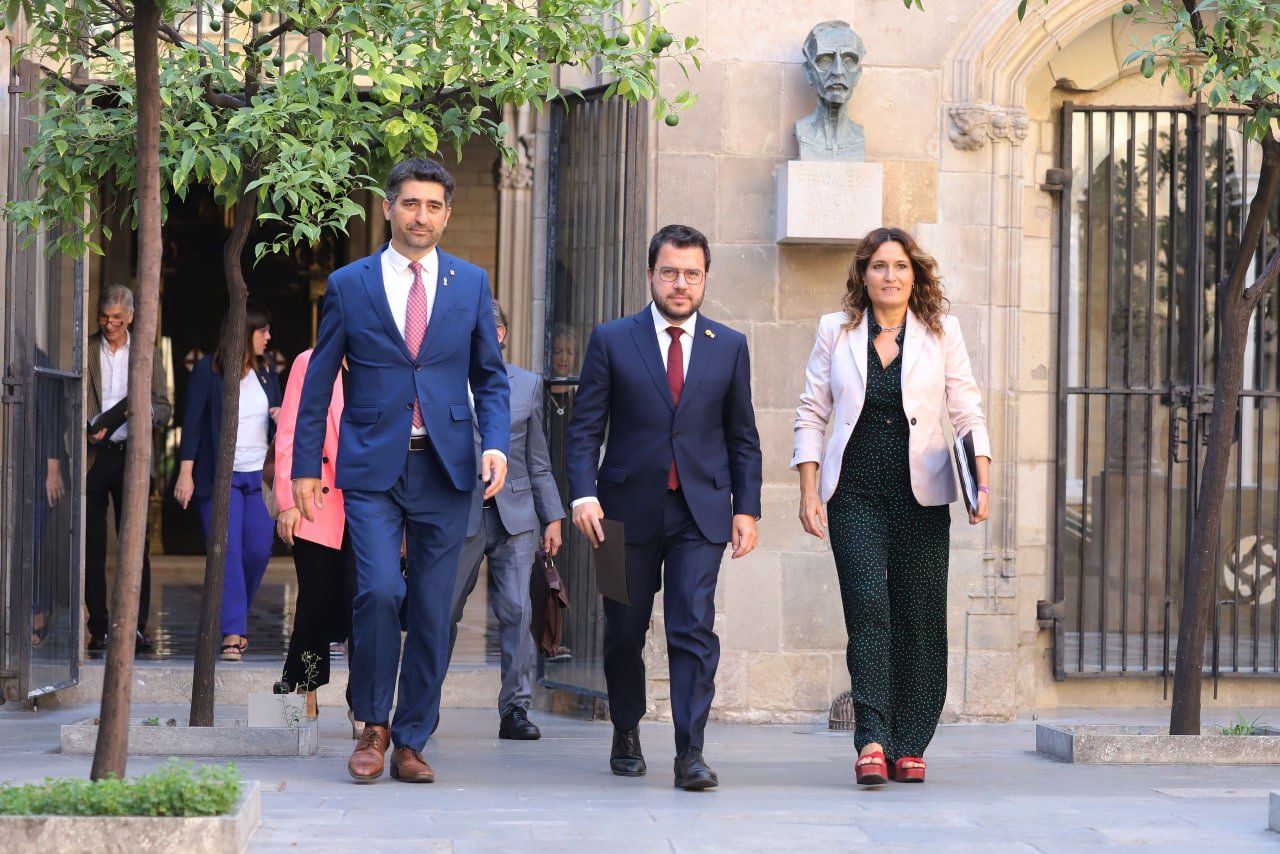The announced absence of the Catalan president, Pere Aragonès, from this Sunday's independence movement demonstration for the Diada has once again highlighted the division within the movement as well as between the coalition government partners, ERC and Junts. The spokesperson for the Catalan executive, Patrícia Plaja, once again had her work cut out in today's most cabinet meeting press conference in trying to isolate the government itself from the conflicts and at the same time defending the unity of the sovereignist movement. Despite admitting that the differences between the partners are "there to be seen" and that the president has become the protagonist of this rupture, Plaja insisted that the will of the executive is to isolate itself from these controversies.
Aragonès made it known last week that he would not attend the demonstration organized by the major civil society organization the Catalan National Assembly (ANC) because he considers that it has been called to show opposition to the political parties and institutions and not against the Spanish state, a view which is backed by ERC and has opened an argument confronting the ANC body with Aragonès and his party.
The Catalan government will be at Sunday's march
When questioned about this situation, the spokesperson asserted that the demonstration called by the ANC is "one more event in a long list of events". Not only that, she defended the normality of the situation arguing that the government will still be represented at the demonstration, given that it has already been announced that the vice-president, Jordi Puigneró, and his fellow ministers from Junts will attend. "Therefore, the government will be at the march", replied Plaja, who avoided specifying whether any ERC ministers would take part in the major Catalan National Day rally.
Plaja reiterated that "the most important thing is for the Diada to be a massive demonstration again", taking into account, as she repeatedly emphasized, that the ANC's demonstration is just one more event. As for the executive, she insisted that it is able to "isolate himself" from "differences and discrepancies", to continue moving towards independence, and she backed the need for "effort from everybody" - the government, the parties and civil society bodies - "to underline the points of understanding of within the independence movement" from an acceptance of diversity. She assured that "the involvement of the president in the independence project is not in doubt, it cannot be questioned" and that "one of the main objectives of this government is moving forward in this process."
UN resolution
During this morning's cabinet meeting, the minister of the presidency, Laura Vilagrà, presented a report on last week's resolution by the United Nations Human Rights Committee against the suspension of the political rights of Oriol Junqueras, Josep Rull, Jordi Turull and Raül Romeva before there was a final judgment against them. The Catalan government is thus calling on the Spanish government to assume its responsibility in these events, and act so that it does not happen again, with effective and legally enforceable reparation.
While admitting that the UN opinion is not a judicial ruling, the spokesperson recalled that it carries a lot of weight for international institutions, such as the European Court of Human Rights and the Court of Justice of the EU, where there are pending cases in relation to the political leaders of the process. The Catalan government is thus demanding that the state carry out the "necessary" reform of Article 384 bis of the Criminal Judicial Law on the suspension of public positions before there is a final judgment, as well as other related rules or that considered necessary to avoid the repetition of these events.
Likewise, the government demands the mandatory official publication of the opinion by the Spanish state and that it articulate a procedural mechanism that allows the application of the opinions that verify the violation of the rights enshrined in the 1966 International Covenant on Civil and Political Rights. Despite these demands in relation to the UN opinion, the spokesperson avoided explaining whether this issue would be taken up at the dialogue table with the Spanish government and limited herself to stating that there was nothing new to report on the dialogue table.
In relation to the Midcat gas pipeline, which was rejected yesterday by the French president, Emmanuel Macron, she assured that it is not an issue that was discussed today. The Catalan government has expressed the view that Midcat is realistic and profitable for Europe as a whole, and has wanted to push the gas pipeline forward and claim Catalonia's role as an energy hub.

